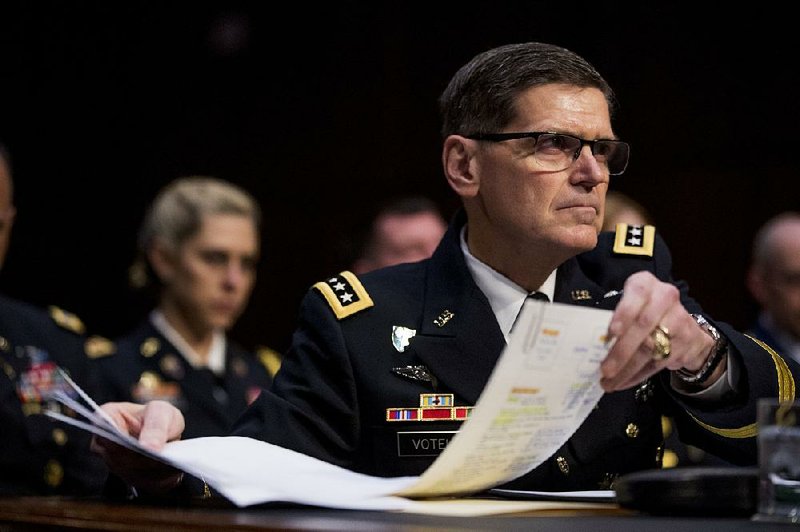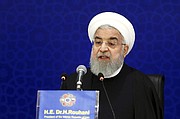WASHINGTON -- The Islamic State militant group could stage a resurgence in Syria once the Pentagon withdraws its troops, the head of the U.S. Central Command told a Senate panel Tuesday in a warning at odds with President Donald Trump's assertions of victory.
The commander, Gen. Joseph Votel, who oversees military operations in the Middle East, also told the Senate Armed Services Committee that the Islamic State still controlled about 20 square miles of territory in Syria. That number, a steep drop from the group's pinnacle of 34,000 square miles held in Iraq and Syria in 2014, has been used by the president to bolster his case that U.S. troops and their allies have largely defeated the Sunni extremist group.
Votel's comments came during a hearing in which senators from both parties questioned Trump's decision to withdraw troops from Syria. It was another instance of top national security leaders diverging from the president on the withdrawal, a decision that led to the resignation of Defense Secretary James Mattis in December.
The remarks also came just a week after the release of an annual intelligence assessment of threats facing the United States that diverged sharply from Trump's statements on a variety of issues, including North Korea, Russia and Syria.
"It is important to understand that even though this territory has been reclaimed, the fight against ISIS and violent extremists is not over and our mission has not changed," Votel said, using an acronym for the Islamic State.
He said that "hard-won battlefield gains can only be secured by maintaining a vigilant offensive against a now largely dispersed and disaggregated ISIS that retains leaders, fighters, facilitators, resources and the profane ideology that fuels their efforts."
Votel is set to retire this spring, and Lt. Gen. Kenneth McKenzie was chosen to replace him.
Under questioning, Votel acknowledged that he wasn't consulted before Trump's announcement that he planned to bring U.S. troops home from Syria "now." While Votel effectively endorsed Trump's decision, he emphasized a methodical approach that the president has increasingly embraced.
"We are adjusting our military posture in Syria, planning and executing a deliberate, safe, and professional withdrawal of personnel and equipment while preserving sufficient power in the region to ensure that we can continue to destroy remnants of ISIS fighters and ensure it does not return," Votel said.
Many Republicans in Congress oppose the withdrawal plans. On Monday, the Senate approved legislation that opposes an abrupt withdrawal of troops from Syria and Afghanistan, warning that such a move could destabilize the region and lead to larger roles for both Russia and Iran. The legislation is largely symbolic.
Trump has indicated he wants to bring home some or all of the 14,000 American troops in Afghanistan, and a U.S. envoy is having talks with the Taliban even though the insurgents refuse to deal with the country's government. The discussions have focused on the U.S. withdrawing its troops in return for Taliban assurances that terrorist groups including al-Qaida and the Islamic State won't be allowed to operate from Afghanistan.
Also Monday, the Pentagon's internal watchdog agency concluded in a report that the Islamic State was already regrouping in Iraq. The report, from the inspector general's office, said that unless there was sustained pressure, the Islamic State "could likely resurge in Syria within six to 12 months and regain limited territory."
According to the report, which covers October through December 2018, U.S. Central Command believes that Islamic State fighters will continue to conduct "opportunistic attacks" on U.S. troops as they withdraw. And, it says, "If Sunni socio-economic, political, and sectarian grievances are not adequately addressed by the national and local governments of Iraq and Syria it is very likely that ISIS will have the opportunity to set conditions for future resurgence and territorial control."
The extremist group will most likely try to portray the U.S. withdrawal as a victory, Pentagon officials have warned.
MIDEAST MANEUVERING
In a wide-ranging report on Central Command's challenges in the Middle East, Votel also noted Saudi Arabia's reduced influence.
"High-profile civilian casualty incidents on behalf of the Coalition in Yemen and international backlash resulting from the murder of Saudi dissident Jamal Khashoggi have damaged Saudi Arabia's international standing," he said in the report.
Under questioning from Sen. Elizabeth Warren, D-Mass., Votel said that "we have no observations of our own" to confirm an Associated Press report of torture and abuse in detention centers in Yemen operated by the United Arab Emirates. The UAE is part of a coalition in Yemen led by Saudi Arabia and backed by the U.S.
"Turning a blind eye is not acceptable," Warren said.
In his testimony, Votel diverged from his commander in chief on the role of U.S. troops deployed to Iraq.
Trump, during an interview that aired Sunday on CBS' Face the Nation, said he wanted U.S. troops to remain in Iraq to "watch Iran" -- an announcement that angered Iraqi leaders and surprised the Defense Department.
U.S. military officials said they could not explain Trump's claims that U.S. forces in Iraq could take a leading role in monitoring Iran's nuclear program or other suspicious activities.
Asked by Sen. Martin Heinrich, D-N.M., whether the U.S. military focus in Iraq had shifted from the Islamic State to Iran, Votel replied, "It has not, senator."
He said that Central Command "remains very focused on the reason that the government of Iraq asked us to come there, and that is focusing on the defeat of ISIS and now preventing the resurgence of that particular organization."
The general said the U.S. is "there at the invitation" of Iraq for the purpose of defeating the Islamic State.
On Tuesday, Iranian President Hassan Rouhani said Trump's comment has exposed American "lies" about fighting terrorism.
Addressing Trump with sarcasm in remarks carried by official media, Rouhani said: "You say you stay in Iraq to watch Iran, while before that you were saying you stay there for fighting terrorism. It is so nice that you honestly expressed yourself!"
"You are in Afghanistan for the same purpose," Rouhani added. "You want to watch, whether Iran or Russia and China."
Iraq's president also rejected Trump's remarks, saying the U.S. does not have permission to use the country as a listening station.
Trump has adopted a hard line on Iran, accusing it of sowing chaos across the region through its proxies in Iraq and other countries. Last year, he withdrew the U.S. from Iran's landmark 2015 nuclear accord with world powers and restored economic sanctions.
Rouhani said the U.S. would never again dominate Iran in the way it did before the Iranian Revolution, when the country was ruled by a U.S.-backed monarchy. Iranians are currently marking the 40th anniversary of the uprising, which brought anti-American clerics to power.
"It is impossible for you to take Iran back to 40 years ago. We will never go back to the era of American domination," he said.
Information for this article was contributed by Helene Cooper of The New York Times; by Glen Carey and Tony Capaccio of Bloomberg News; and by Matthew Lee, Lolita C. Baldor and staff members of The Associated Press.
A Section on 02/06/2019

